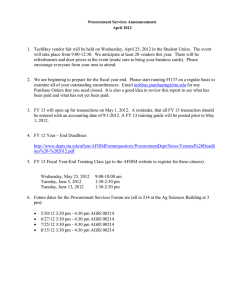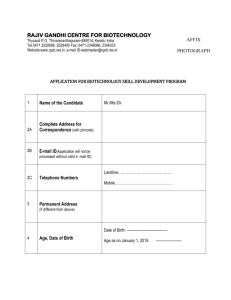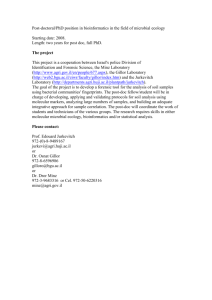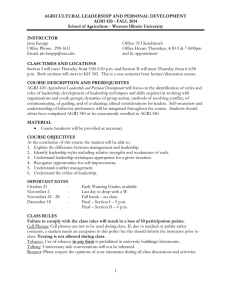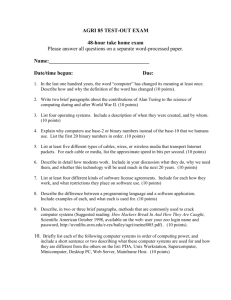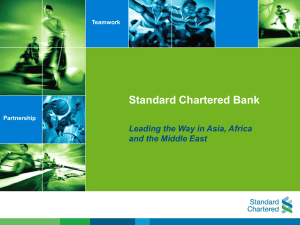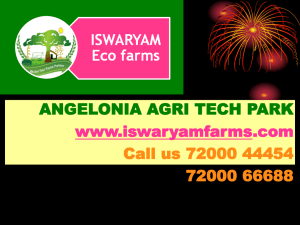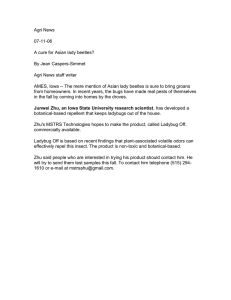BSc (Hons) Food Science and Technology (Minor: Seafood Technology) (Full-time)
advertisement
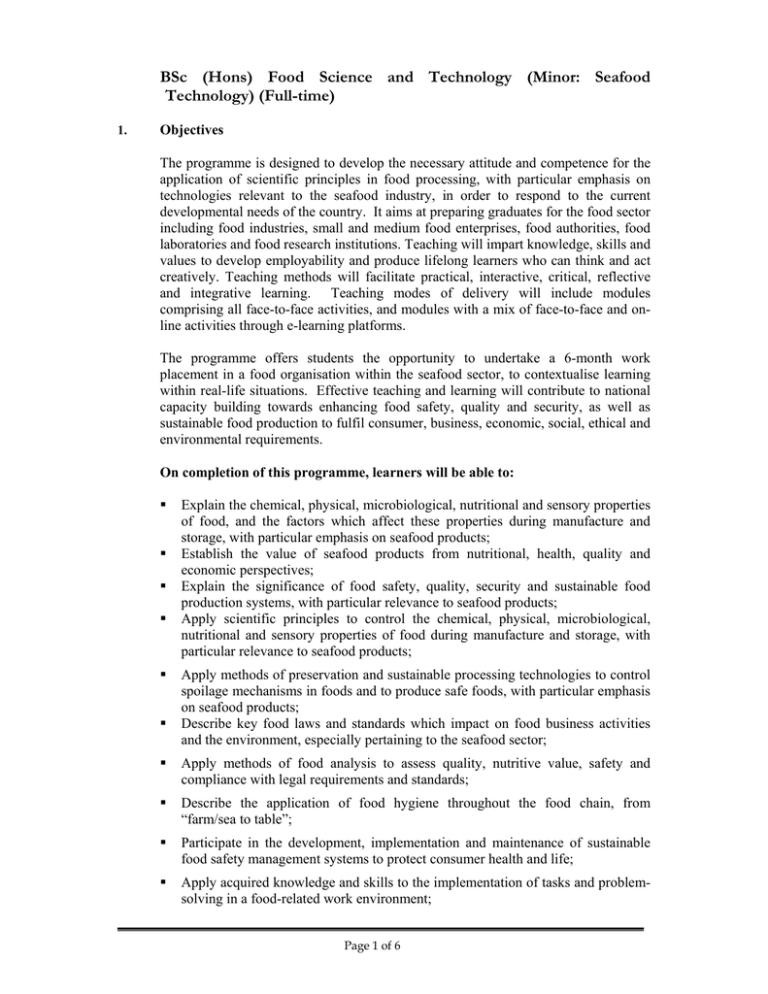
BSc (Hons) Food Science and Technology (Minor: Seafood Technology) (Full-time) 1. Objectives The programme is designed to develop the necessary attitude and competence for the application of scientific principles in food processing, with particular emphasis on technologies relevant to the seafood industry, in order to respond to the current developmental needs of the country. It aims at preparing graduates for the food sector including food industries, small and medium food enterprises, food authorities, food laboratories and food research institutions. Teaching will impart knowledge, skills and values to develop employability and produce lifelong learners who can think and act creatively. Teaching methods will facilitate practical, interactive, critical, reflective and integrative learning. Teaching modes of delivery will include modules comprising all face-to-face activities, and modules with a mix of face-to-face and online activities through e-learning platforms. The programme offers students the opportunity to undertake a 6-month work placement in a food organisation within the seafood sector, to contextualise learning within real-life situations. Effective teaching and learning will contribute to national capacity building towards enhancing food safety, quality and security, as well as sustainable food production to fulfil consumer, business, economic, social, ethical and environmental requirements. On completion of this programme, learners will be able to: Explain the chemical, physical, microbiological, nutritional and sensory properties of food, and the factors which affect these properties during manufacture and storage, with particular emphasis on seafood products; Establish the value of seafood products from nutritional, health, quality and economic perspectives; Explain the significance of food safety, quality, security and sustainable food production systems, with particular relevance to seafood products; Apply scientific principles to control the chemical, physical, microbiological, nutritional and sensory properties of food during manufacture and storage, with particular relevance to seafood products; Apply methods of preservation and sustainable processing technologies to control spoilage mechanisms in foods and to produce safe foods, with particular emphasis on seafood products; Describe key food laws and standards which impact on food business activities and the environment, especially pertaining to the seafood sector; Apply methods of food analysis to assess quality, nutritive value, safety and compliance with legal requirements and standards; Describe the application of food hygiene throughout the food chain, from “farm/sea to table”; Participate in the development, implementation and maintenance of sustainable food safety management systems to protect consumer health and life; Apply acquired knowledge and skills to the implementation of tasks and problemsolving in a food-related work environment; Page 1 of 6 2. Participate in interactive communication and team-working to ensure effectiveness and efficiency of academic as well as professional activities; Apply the steps involved in a research process; Demonstrate effective written and oral scientific communication skills; Make a positive contribution to the successful development of small and medium food enterprises, food industries and catering organisations; Engage in enhancing the effectiveness and sustainability of the national food control system; Embark on training programmes at postgraduate level. General Entry Requirements In accordance with General Entry Requirements for Admission to the University for Undergraduate Degrees. 3. Programme Requirements SC : Credit in Mathematics and Chemistry 2 GCE 'A' Level passes in related approved Science subjects (Mathematics, Chemistry, Physics, Biology, Food Studies). Preference will be given to candidates holding ‘A’ Levels in Chemistry and either Food Studies or Biology or Physics. 4. Programme Duration Normal (Years) 3.5 Degree Maximum (Years) 5.5 5. Credits Per Year: Minimum 18 credits, Maximum 48 credits subject to Regulation 4. 6. Minimum Credits Required For Award of Undergraduate Degree: 106 Breakdown as follows: Credits Core Modules Project Work Placement 91 9 6 Degree Students may exit with a (a) Certificate after having earned 30 credits in core modules (b) Diploma after having earned 60 credits in core modules Page 2 of 6 7. Assessment Each module will be assessed over 100 marks (i.e. expressed as %) with details as follows (unless otherwise specified). Assessment will be based on a Written Examination of 2-3 hour duration, carrying a weighting of 70%, and Continuous Assessment carrying 30% of total marks for AGRI modules. Continuous Assessment will be based on laboratory/field work, and/or assignments, and should include at least 1 class test. Written examinations for all AGRI modules will normally be carried out at the end of the academic year (unless otherwise specified). An overall total of 40% for combined Continuous Assessment and Written Examination components would be required to pass the module, without minimum thresholds within the individual Continuous Assessment and Written Examination. Modules will carry the weightings of 1, 3 or 5 depending on their status (Introductory, Intermediate or Advanced). Weighting for a particular module is indicated within parentheses in the module code. Each module will carry credits in the range of 3 to 6. Project - AGRI 3000Y(5) will carry 9 credits. The module Food Product Development - AGRI 3069Y(5) will carry 1 credit. Students who do not have ‘O’ level pass in Biology will be required to follow the module Structure and Function of Multicellular Organisms and Ecosystem – AGRI 1000 in the first semester of the first year of the programme of study. Assessment will be based on a Written Examination carrying a weighting of 70%, and Continuous Assessment carrying 30% of total marks. The Written examination for this module will be carried out at the end of the first semester of the first year of the programme of study. The module will carry no credits. For satisfactory completion of the module, a minimum of 40% should be attained. Students not obtaining 40% will have to retake same in the second semester of the first year of the programme of study Assessment of the module Scientific Communication Skills and Methods - AGRI 2130 will be based on continuous assessment throughout the module and/or submission of a portfolio, as per Faculty’s guidelines. The module will carry no credits. For satisfactory completion of the module, a minimum of 40% should be attained. Assessment of the module Food Product Development – AGRI 3069Y(5) will be based on group presentation and submission of group portfolio in the first week of the second semester of the final year. Assessment of the Work Placement – AGRI 2103Y(5) will be by continuous assessment solely and will be based on employer’s assessment report, submission of work placement report and a presentation, as per guidelines of the Faculty of Agriculture Work Placement Handbook. A minimum of 50% should be attained to pass this module. Page 3 of 6 8. Academic Teaching in Case of an Emergency To ensure minimal disruption of normal academic teaching in case of an emergency (e.g. closure of the University for more than 2 weeks), the i.Learn e-Learning Platform of VCILT will be used to deliver Teaching and Learning content. Relevant learning resources will be posted on the Platform. Assignments (if any) will be submitted using the online submission box. Arrangements will be made to register students on the e-Learning Platform at the beginning of the academic year. 9. List of Modules CORE MODULES Module Code Module Name AGRI 1010Y(1) AGRI 1012Y(1) AGRI 1014Y(1) AGRI 1041Y(1) AGRI 1052Y(1) Basic Food Engineering Biochemistry and Nutrition Food Chemistry and Food Analysis I Introduction to Agricultural Production Chemistry Fundamentals and Laboratory Techniques Data Handling and Research Methodology Introduction to Management in Food Industries Food Microbiology I Seafood Production and Composition Food Chemistry and Food Analysis II Unit Operations in Food Processing Molecular Biology Food Quality Management Food Processing Experimental Designs and Sampling Techniques Food Hygiene and Safety Food Microbiology II Seafood Processing Technology and Quality Scientific Communication Skills and Methods Project Food Legislation Developments in Food Science and Technology Food Product Development Postharvest Management Advances in Seafood Processing Technology Advances in Seafood Safety and Quality AGRI 1071Y(1) AGRI 1072Y(1) AGRI 1083Y(1) AGRI 1084Y(1) AGRI 2015Y(3) AGRI 2018Y(3) AGRI 2019Y(3) AGRI 2087Y(3) AGRI 2105Y(3) AGRI 2112Y(3) AGRI 2114Y(3) AGRI 2148Y(3) AGRI 2149Y(3) AGRI 2130 AGRI 3000Y(5) AGRI 3014Y(5) AGRI 3017Y(5) AGRI 3069Y(5) AGRI 3088Y(5) AGRI 3118Y(5) AGRI 3119Y(5) Hr/Yr L+P 60+60 75+30 60+60 45+0 30+60 Credits 30+30 30+30 30+30 60+30 75+30 30+30 30+30 45+30 75+30 30+30 45+30 30+30 45+30 35+0 45+0 45+0 15+0 45+0 30+30 30+30 3 3 3 5 6 3 3 4 6 3 4 3 4 9 3 3 1 3 3 3 6 months 6 6 6 6 3 4 WORK PLACEMENT AGRI 2103Y(5) Work Placement BASIC MODULE IN BIOLOGY FOR STUDENTS WHO DO NOT HAVE ‘O’ LEVEL BIOLOGY Page 4 of 6 AGRI 1000 Structure and Function of Multicellular Organisms and Ecosystems 45+0 - TOTAL NUMBER OF CREDITS 106 10. Programme Plan – BSc (Hons) Food Science and Technology (Minor: Seafood Technology) (with 6-month work placement) YEAR 1 Code Module Name Hr/Yr Credits L+P AGRI 1010Y(1) Basic Food Engineering 60+60 6 AGRI 1012Y(1) Biochemistry and Nutrition 75+30 6 AGRI 1014Y(1) Food Chemistry and Food Analysis I 60+60 6 AGRI 1041Y(1) Introduction to Agricultural Production 45+0 3 AGRI 1052Y(1) Chemistry Fundamentals and Laboratory 30+60 4 Techniques AGRI 1071Y(1) Data Handling and Research Methodology 30+30 3 AGRI 1072Y(1) Introduction to Management in Food Industries 30+30 3 AGRI 1083Y(1) Food Microbiology I 30+30 3 AGRI 1084Y(1) Seafood Production and Composition 60+30 5 AGRI 1000* Structure and Function of Multicellular 45+0 Organisms and Ecosystems ONLY for students who do not have ‘O’ Level Biology Code AGRI 2015Y(3) AGRI 2018Y(3) AGRI 2019Y(3) AGRI 2087Y(3) AGRI 2105Y(3) AGRI 2112Y(3) YEAR 2 Module Name AGRI 2114Y(3) AGRI 2148 Y(3) AGRI 2149Y(3) AGRI 2130 Food Chemistry and Food Analysis II Unit Operations in Food Processing Molecular Biology Food Quality Management Food Processing Experimental Designs and Sampling Techniques Food Hygiene and Safety Food Microbiology II Seafood Processing Technology and Quality Scientific Communication Skills and Methods AGRI 2103Y(5) Work Placement Page 5 of 6 Hr/Yr L+P 75+30 30+30 30+30 45+30 75+30 30+30 Credits 45+30 30+30 45+30 35+0 4 3 4 - 6 months 6 6 3 3 4 6 3 YEAR 3 Module Name Code AGRI 3000Y(5) AGRI 3014Y(5) AGRI 3017Y(5) AGRI 3069Y(5) AGRI 3088Y(5) AGRI 3118Y(5) AGRI 3119Y(5) Project Food Legislation Developments in Food Science and Technology Food Product Development Postharvest Management Advances in Seafood Processing Technology Advances in Seafood Safety and Quality TOTAL NUMBER OF CREDITS Hr/Yr L+P 45+0 45+0 Credits 15+0 45+0 30+30 30+30 1 3 3 3 9 3 3 106 Page 6 of 6
